Different Grades Of Weed: How High Can You Go?
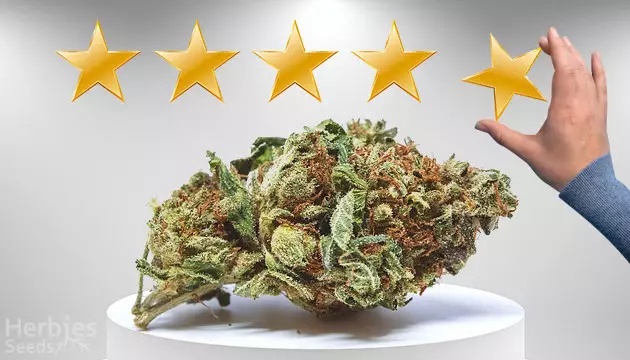
Marijuana is a natural product. While most of the time, this aspect of weed is celebrated and even revered, it also means that every single bud consumed has gone through several stages of life before coming to you. With each of the steps such as breeding, flowering or storing, there’s the opportunity to add quality and value to the product. However, there’s also the chance of something going wrong, with the end product coming out as nothing more than schwag. But what’s the actual difference between different grades of bud? Let us explain.
Disclaimer: This content is intended for readers in regions where cannabis use and cultivation are legally permitted. Please ensure you comply with local laws before purchasing, consuming, or growing cannabis.
What Does The Quality Of Weed Depend On?
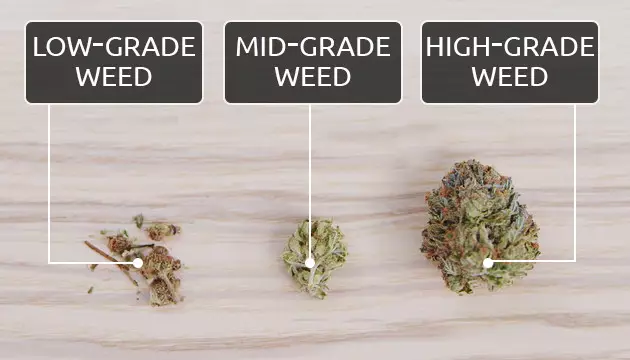
Firstly, you don’t need to be an expert to be able to identify the quality of marijuana you’re holding. With a solid base of background understanding, plus the utilization of a few simple techniques, you’ll be able to pick the cream of the crop from the trash in no time.
Today, we’ll go over the commonly used grading system of weed and explore what it is that makes each category stand out from one another. But first, let's talk about a few basic concepts of marijuana that will set the groundwork for identifying the right smoke.
Genetics
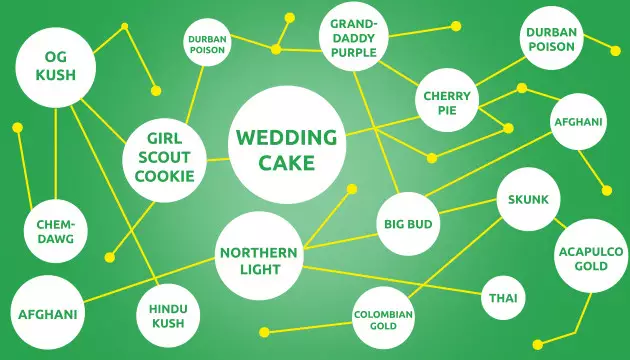
Like anything natural, from cannabis to racehorses, genetics can make all the difference. Put simply, the genetics of marijuana are determined by the two parent plants that were crossed to produce it.
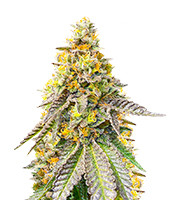
- Photoperiod
- Impact on mind and body
- 500 - 550 g/m² indoors
500 - 600 g/plant outdoors
For example, the popular Girl Scout Cookies strain came to be after crossing Durban Poison with OG Kush. Because this act of breeding forms the basis of all marijuana consumed today, it’s important to know the source of a plant's genetics, as this will help you determine the quality of the bud before you’ve even seen it.
Growing Skills
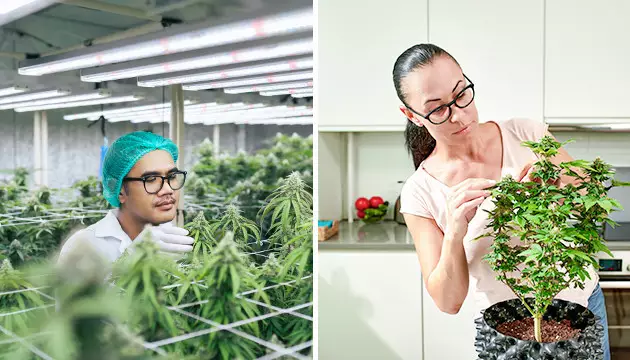
Let's face it, not everyone can produce great weed. To hedge against purchasing bad weed, make sure to do your research on both who grew the plant and how it was grown. A good grower knows how to keep the environment just right, and how to identify problems like bugs and mold before these take hold of a crop.
Storage
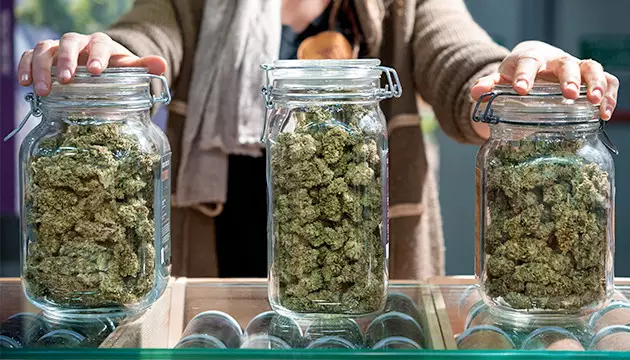
Whether you buy from a dispensary or the street, make sure to check how your source stores their product. Is it stored in glass or another form of commercial packaging within a temperature-controlled environment? This is a good sign, indicating that your source cares about the quality of their product.
Is it packed into disposable plastic bags and kept in a humid environment where temperatures fluctuate? This can be the first sign of trouble, as problems such as mold or other contaminants can run wild in such conditions.
Now that we’ve covered a few of the basic concepts that can lead to either high- or low-quality weed, let's dive into the actual differences between low-, medium-, and high-grade marijuana, and learn how to easily identify each one.
Low-Grade Weed
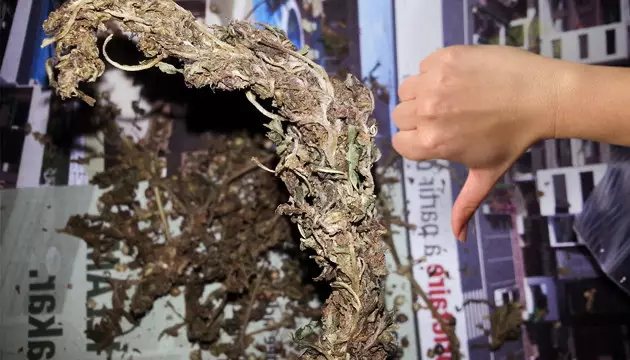
Starting at the bottom of the barrel is low-grade weed. Known by names such as schwag, reggie weed and shake, bad weed is, quite simply, really bad. Yet some people buy it – typically either because it’s cheap or the only option available. It can be recognized in several ways, both before and after consumption.
The Look Of Bad Weed
Bad weed is often darker (sometimes you even see brown weed) and more brittle than better products due to improper drying and curing methods. It may also have been harvested too early, resulting in extremely light and airy buds that have lower cannabinoid content than flowers left to fully mature.
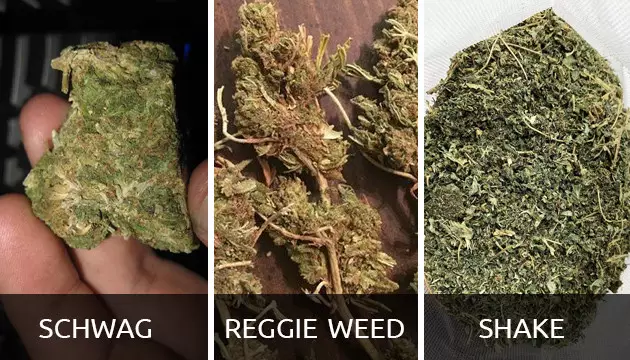
The whole bag, or some parts of it, could have a poor ratio of plant matter to seeds and stems, resulting in a smaller amount of usable product overall. If you look at low-quality weed under a microscope or simply zoom in with your phone’s camera, you’ll usually see small, fragile trichomes that have been damaged during packaging or transportation.
Low-grade weed:
- Dark in color
- Airy and light
- Poor plant to seed/stem ratio
The Taste And Aroma Of Schwag – It’s No Good
When something is fresh, clean and beautiful, it comes through in the smell. When something is none of those things, you can also usually tell by giving it a good sniff.
Bad weed usually carries a musky smell from higher moisture content, an overly grassy stink from too much chlorophyll left over from drying and curing, or a dead foliage smell from being exposed to too much heat and sunlight. All of these factors negatively affect terpenes and flavonoids of marijuana. In all cases, you’ll usually miss the onslaught of fruity, flowery, gassy or earthy smells that erupt from a freshly opened bag of good weed. You can imagine that weed that smells bad won’t have much to its taste either – both of the qualities are dependent on terpenes that are usually destroyed or poorly pronounced in bad weed.
Low-grade weed:
- Musky or grassy smell
- Dead foliage scent
- Weak taste
The Effect Of Reggie Weed
Depending on how much marijuana you usually consume, the effects of bad weed will vary. If you only consume occasionally, you’ll still notice a physiological effect after the consumption of low-quality marijuana. However, if you’re a regular consumer, the effects of smoking bad weed might not register at all, as the cannabinoid content of the product could be simply too low.
However, what will happen to everyone, whether novice or veteran, is that consuming too much will quickly bring about negative effects – not from getting too high, but from consuming too much of any contaminant in the weed, whether this is residual chemicals used in the growing phase, or molds and other pathogenic bacteria picked up along the way.
Disclaimer: Cannabis affects individuals differently, and effects can vary depending on the strain and tolerance. Please use cannabis responsibly and consult a healthcare provider for medical advice before use.
Cannabinoid Content Of Low-Grade Weed
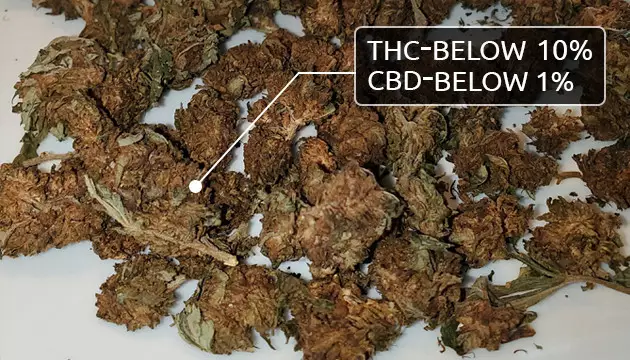
While numbers aren’t everything, they also don’t lie, and knowing the exact cannabinoid (natural chemicals found in cannabis) content of the product is a great way to know what you’re smoking. Generally, low-quality weed corresponds with low quantities of active cannabinoids such as THC and CBD – usually below 10% and 1% respectively – which means you’ll feel less of an effect from smoking it.
Mid-Grade Weed
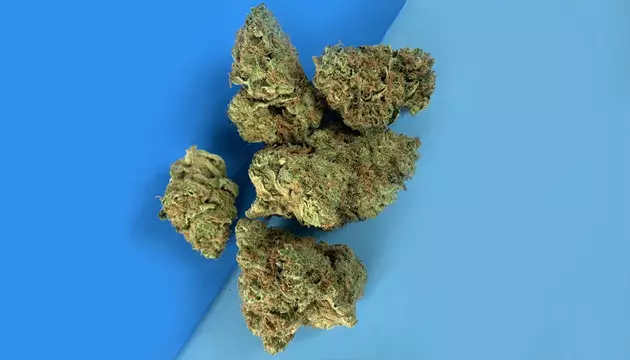
You know those times when the cheapest bottle of wine won’t do, but you don’t feel like splashing out on something with a French name? The world of weed has those moments too, and that's exactly where mid-grade weed comes into its own. Neither high nor low-grade, mid is just right for those everyday moments when you want to enjoy weed as it’s been enjoyed for millennia; smoothly and comfortably.
The Feel Of Mid-Grade Weed
To be honest, the classification of mid-grade weed is usually when it isn’t terrible, but also not a prime example of bud. As you can imagine, this leaves a lot of room for variance. However, generally speaking, mid-grade weed will have a slight give to it when gently squeezed, while still being dry enough to have an audible snap when broken apart.
There should be a good plant matter to stem ratio, with few if any seeds, meaning you’re getting what you paid for; consumable product. On the outside of the bud, you should notice a decent amount of fully developed trichomes, signifying that the plants were harvested at the ideal time.
Mid-grade weed:
- Slight give when squeezed
- Snaps when broken apart
- Good plant to stem ratio
The Way It Smells And Tastes
Mid-grade weed will carry and hold more aroma than low-grade, both when packaged and consumed. Instead of a stale, musky smell, a bag of mid should smell alive yet stable, like a vase of dried flowers rather than the leafy low-grade. These aromas carry through to the taste of the bud, which should have at least some floral or earthy notes and be free of any taste associated with mold or mildew.
Mid-grade weed:
- Scent free of moldy notes
- Pronounced notes both in taste and aroma
The Effect Of Mid-Grade Weed
Again, the effects of mid-grade weed can vary, depending on exactly how ‘mid-grade’ it is. What should be consistent though is a relatively quick onset time, followed by a smooth high or stone that's definitely noticeable but not overbearing, allowing you to get on with your day while still feeling relaxed.
Disclaimer: Cannabis affects individuals differently, and effects can vary depending on the strain and tolerance. Please use cannabis responsibly and consult a healthcare provider for medical advice before use.
Now To The Cannabinoid Content
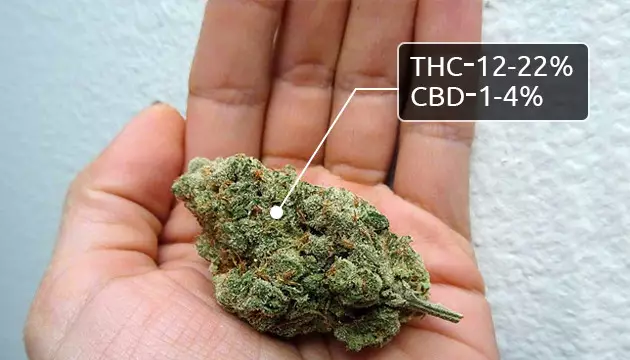
Compared to bad weed, mid-grade marijuana can have relatively high levels of varying cannabinoids. THC is usually between 12-20%, with CBD content sometimes creeping above 1 or 4% depending on the specific strain.
High-Grade Weed
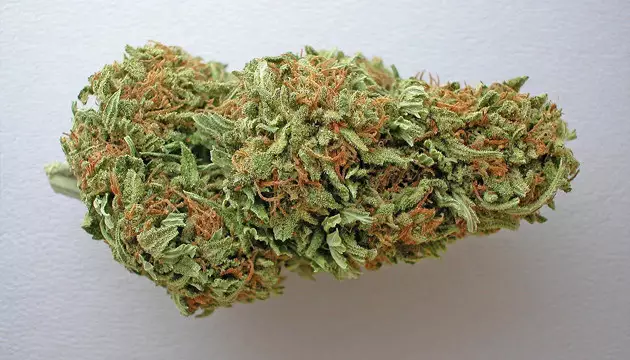
Sometimes, nothing but the best will do. When such times come around, you can always turn to high-grade weed to get the job done. Known as top-shelf, primo, skunk, dank, and many other names, high-grade cannabis is recognized for its Instagram-perfect appearance, potent aroma, and otherworldly effects.
The Feel Of High-Grade Weed
The first thing you can usually notice when looking at high-grade marijuana is the crystalline sheen of trichomes that coat the flower both inside and out. When you pick up the bud, it should be perfectly manicured, with the vast majority of leaf and stem removed, leaving only the sparking flower behind.
As with mid-grade weed, squeezing the bud gently should demonstrate a bit of give in the bud, yet you should hear a definite crack when you break the bud apart, meaning that care has been taken when drying and curing to maintain the correct levels of humidity and temperature.
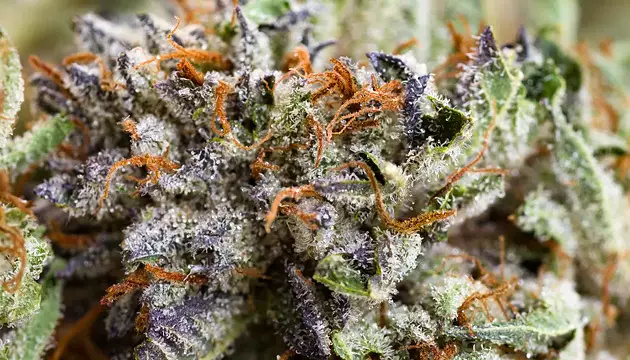
High-grade weed:
- Covered in crystal-like trichomes
- Well-manicured
- Slight give when squeezed
- Definite snap when broken apart
Bright Terpenes Of High-Grade Marijuana
If you’ve ever heard the term ‘loud’ used to describe marijuana and not quite understood, wait until you smell a bag of top-shelf weed; the aroma is enough to get you feeling all kinds of ways.
Depending on the variety, high-grade marijuana will carry strong notes of dominant terpenes and flavonoids, whether they be fruity or earthy, as well as usually having undertones of less dominant scents that require a keen nose to pick up. The terpenes of the consumed flower will also be strong and pronounced, bursting in the mouth at the first hit and lingering long after you’ve finished consuming.
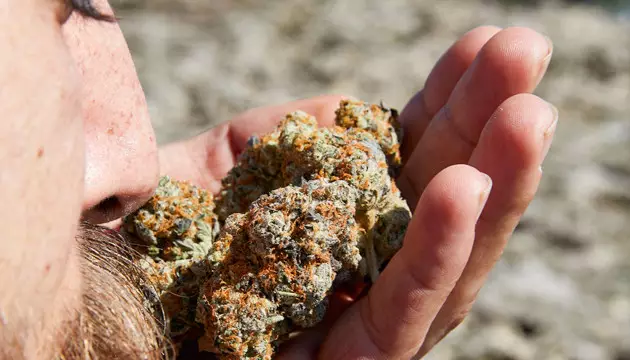
High-grade weed:
- A pronounced aroma of many notes
- Bright, long-lasting taste
The Effect Of Top-Shelf Weed
Again, the effects of high-grade weed, like low and mid, are subjective and based on the individual consumer’s physical and mental tolerance. It’s also highly dependent on the particular strain you happen to have, where that strain was grown, and who grew it. In saying that, high-grade weed is usually strong. Really strong.
From the first taste, you should notice strong physiological changes, ranging from the complete relaxation and almost melting sensation of your body to an intense head rush that can stay for hours or mellow out into a gentler, long-lasting high.
Disclaimer: Cannabis affects individuals differently, and effects can vary depending on the strain and tolerance. Please use cannabis responsibly and consult a healthcare provider for medical advice before use.
Cannabinoid Content Of Real Dank Weed
High-grade weed comes from genetics that have been specifically bred to produce outstanding pot. The traditional way of doing this was to jack up the THC content as high as it could go. While there are now many more parameters for breeders and growers to consider when creating a great plant, the effects of this THC arms race can still be seen in the, let's be honest, unnaturally high cannabinoid content of high-grade weed.
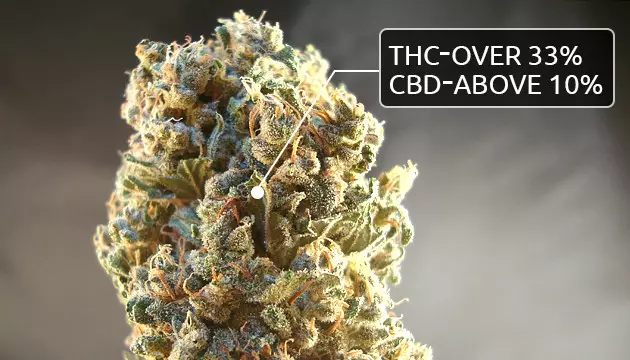
THC, being the most active and also most commonly known cannabinoid, still reigns supreme, with high-grade weed testing at well over 20%, and some strains being cultivated coming in at over 33% THC! However, other cannabinoids are now also seeing the limelight, with CBD content of some strains rocketing up the charts to above 10%, as well as lesser-known cannabinoids such as CBN, CBG and THCV being heavily researched and sought out in high-grade weed.
Disclaimer: High-THC strains should be consumed with caution, particularly for novice users. Start with a low dose and be aware of your personal tolerance level.
Where To Now?
The world of marijuana can be a confusing place, especially when it comes to understanding the different levels of weed. That’s why such a simple grading system of weed – low, medium and high – has had such a profound effect on the market and what people consume. Other than getting a surprise at the strength, you’re usually safe choosing the highest quality weed your budget allows. Not only will this be the best bet for your weed being free of any chemical or biological contaminants that could cause you harm, it’s all-around better quality and higher cannabinoid content will give you stronger effects for longer, meaning you'll need to smoke less, saving you money in the long run.
The same principles apply when selecting cannabis seeds. Choosing seeds from reputable sources with high-grade genetics ensures that you start your cultivation journey with the best possible foundation. High-quality seeds are more likely to produce plants with superior potency, flavor, and yield, ultimately leading to a more rewarding growing experience and a better final product. Whether you're a seasoned grower or a novice, investing in top-tier seeds is a decision that pays off in both the quality and quantity of your harvest. Really, there’s nothing to lose.
You’ve reached the end of the article – thanks for following through! As a reward for your interest in our blog, we’ve hidden a special promo code for an awesome bonus seed that you can add for free to your next order. Hint: open the first recommended article, your promo code might be waiting for you right there...
Disclaimer: Before purchasing and growing cannabis seeds, ensure that cannabis cultivation is legal in your region.
Herbies Head Shop expressly refuses to support the use, production, or supply of illegal substances. For more details read our Legal Disclaimer.

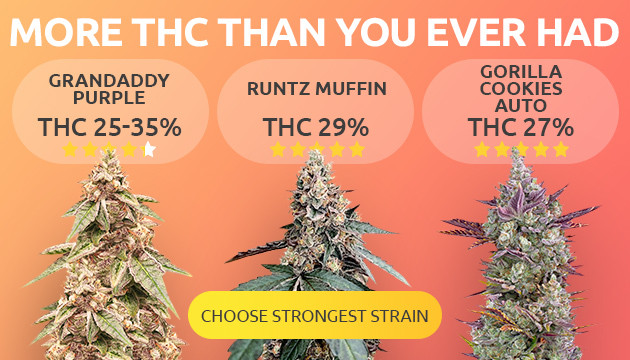
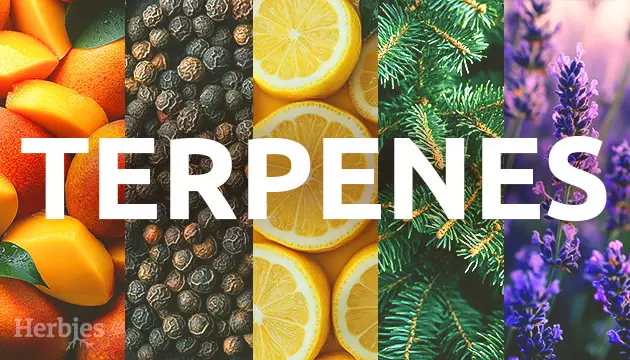



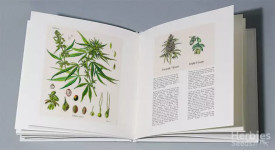


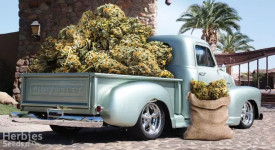


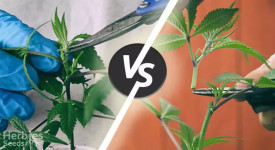
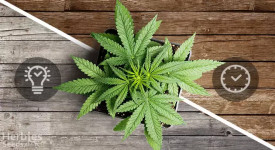


Thank you for leaving a comment for us!
Your feedback will be posted shortly after our moderator checks it.
Please note that we don’t publish reviews that: